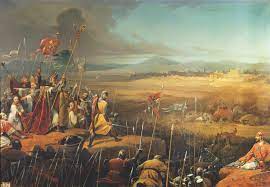Prior to the First Crusade, however, he had his own set of difficulties. The Turks were organized in several different tribes that saw each other as rivals: Seljuks (Aslan's tribe), Danishmends, Mangujekids, Saltuqids, Tengribirmish, Artuqids, and Akhlat-Shahs. Upon the death of Arslan's father, Suleyman (d.1086), the Sultan Malik Shah I of Isfahan imprisoned him, seeing him as a potential rival. When Malik died in 1092, a quarrel among his jailers allowed him to escape, after which he assembled an army and set up a capital for himself in Nicaea.
In times of political rivalry, carefully chosen alliances become vital. A non-Turkish complication in this part of the world was the size and proximity of the Byzantine Empire. Nicaea was in Byzantine Territory, and Arslan was able to set up his capital there (relatively safe from his Turkish rivals) because of a strategic alliance.
Arslan married the daughter of Emir Tzachas, a Seljuk Turkish military commander. Tzachas had earlier in life become a significant member of Byzantine society, until he lost his position when Emperor Alexios Comnenos I came to power and dismissed him. He then became an enemy of the Byzantines. Arslan married the daughter, Ayşe Hatun, to strengthen his own power against the Byzantines.
Then there was a twist: Arslan received a communication from Alexios, claiming that Tzachas intended to usurp him. Arslan marched his army to Tzachas' location, invited his father-in-law to a banquet, and killed him. This simple act ingratiated him to Alexios. When the Crusade of 1101 captured Nicaea and sent Ayşe Hatun to Costantinople to be held for ransom, Alexios sent her back without a ransom, in order to honor his alliance with Arslan.
Kilij Arslan, whose name means literally "sword lion," drowned in 1107 while crossing the Khabur River to escape a losing battle against a rival. In January 2021, archaeologists found his grave in Silvan, in Turkey.
Emperor Alexios Comnenos' name keeps cropping up in discussions of the Crusades, and he should probably be discussed a little more, but that's for tomorrow.


